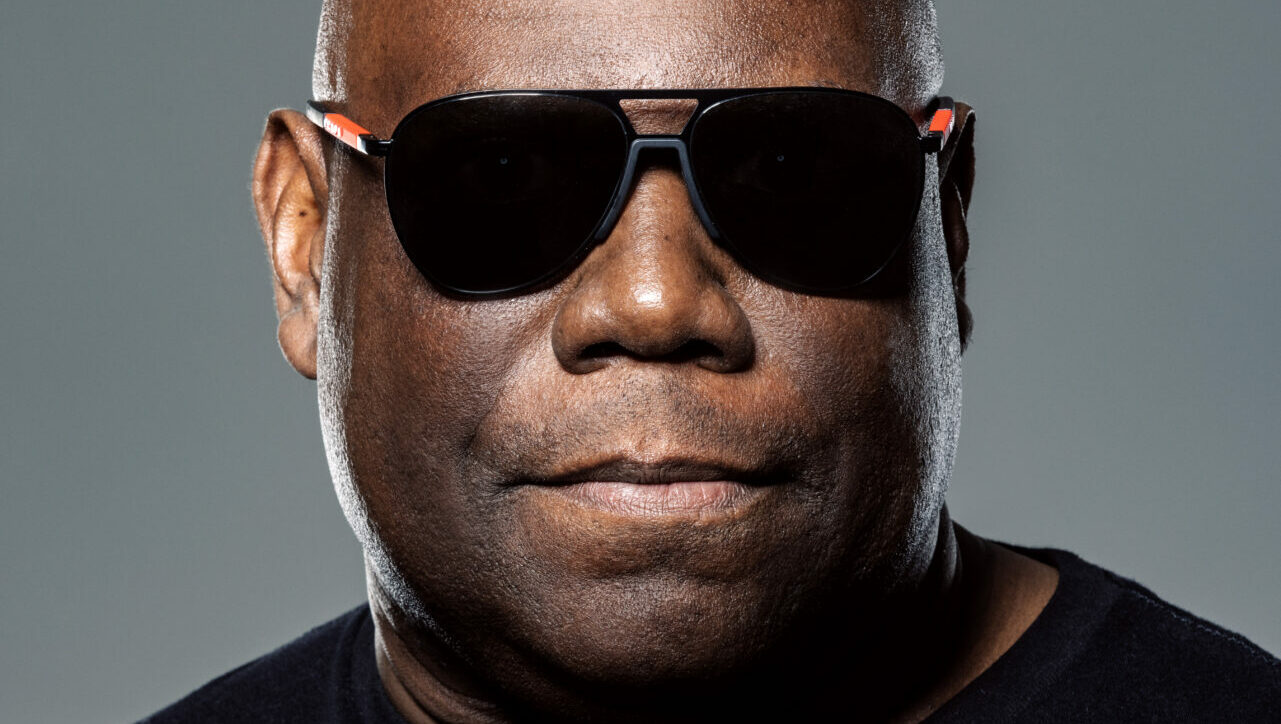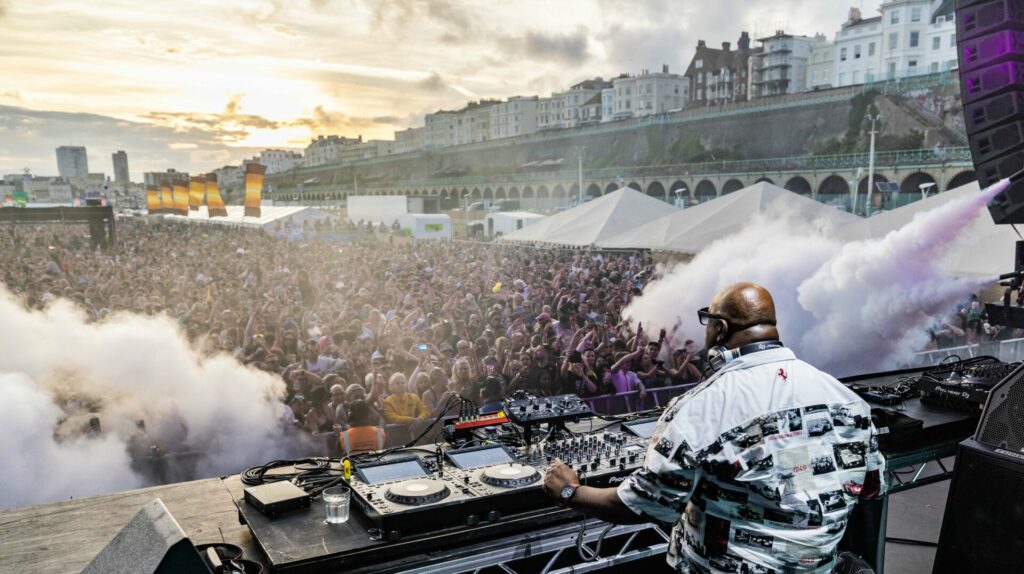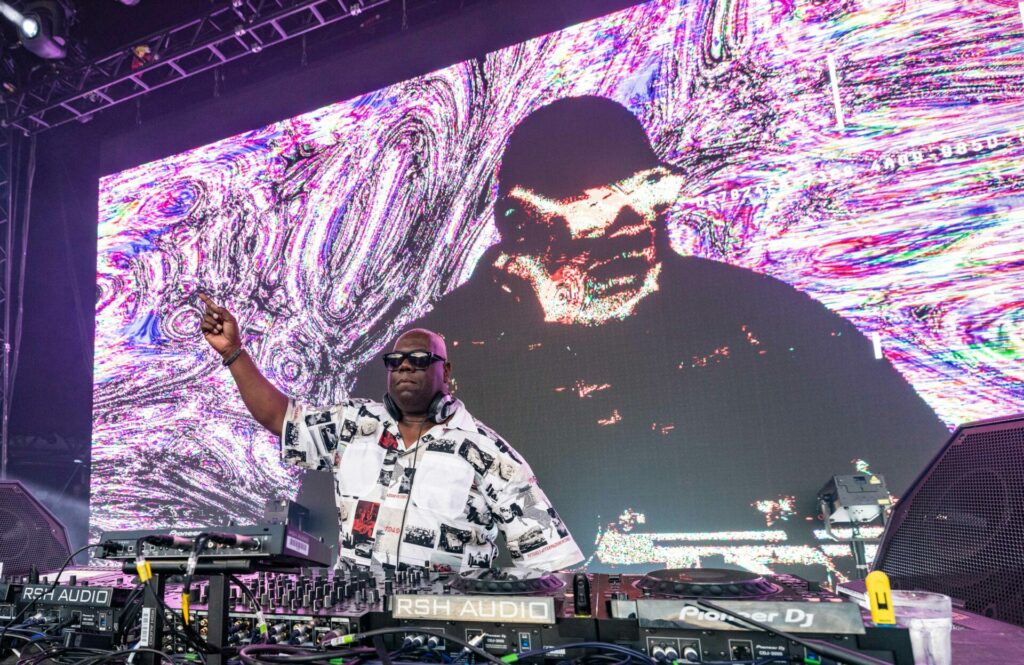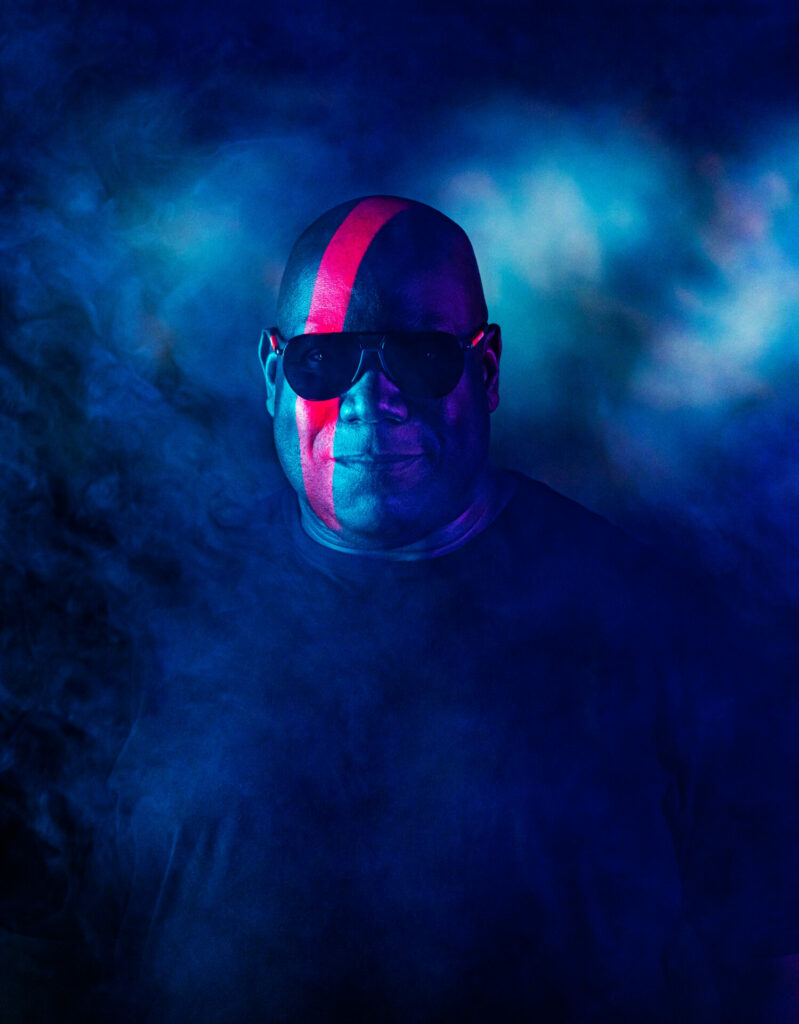Carl Cox: the superstar DJ on four decades igniting dancefloors
With ‘Electronic Generations’, his first album in a decade, the legendary DJ, producer, and original club kid turns to the dark side of techno, delivering thrilling live performances. He tells Rolling Stone UK how, four decades into his career, he’s making his most rebellious music to date

Wembley Arena, 4am. Carl Cox is towering above the crowd from a colossal LED-lit booth, tearing into the menacing, machine-driven techno of his new album Electronic Generations. It’s the first time Cox has played the album — his first in 10 years — live, and he’s doing it with a megawatt grin. Thrashing between banks of synthesisers, gadgets, and gizmos, he’s one-part mad scientist and one-part techno-evangelist, spreading the love of the kick-drum to the masses. Thundering bass booms from a Funktion-One sound system; a storm of silver lasers strike sweat-drenched bodies. “I am you, you are me. It’s time to get back to the beats,” a vocal sample insists, and the crowd explodes into a groove, grinding hip to hip, jumping up and down, shouting, and moshing.
At 60 years old, Cox could easily just slow down and hit the sync button. Instead, he’s turning to the dark side. For Cox, this is his punk period: a raucous dive into live performance, making techno that’s undiluted, upfront, and raw. When you’re mixing and creating machine-driven music on the fly, there’s the risk of it all going wrong in front of thousands, but Cox doesn’t have that concern. He feels at the top of his game, producing his most rebellious music to date, a battle cry from one club kid to the next.
“This music isn’t for the radio,” he says, speaking over Zoom from the Isle of Man (his virtual backdrop is of his studio in Melbourne, where he’s usually based). “It’s not music that is asking to be liked, or trying to fit into what’s considered ‘hot’. There’s no hype, no fillers, just straight-up beats and basslines designed to move the mind, body, and soul. I’m feeling the most creative I’ve ever been, making all this music with all these machines and playing it live.”
Thanks to his technical skills as a DJ and his musical prowess, Cox has skyrocketed from his early cult status in the acid house scene, to a champion of techno, breakbeat, jungle, drum and bass, and beyond, to the superstar DJ that he is known as today. Along the way he has protested for the ‘right to rave’ during the Thatcher years; become a record label boss, a producer, and a BBC Radio 1 and Kiss FM DJ; made a cameo in cult rave film Human Traffic; and more recently created a rock-inspired breakbeat track with Woody Harrelson for Venom 2. He’s a pivotal part of Ibiza history, regularly playing at Pacha, Privilege, Amnesia, and recently locked down a residency at DC-10 following his iconic run at Space. And, as one of the most charming DJs in the business, he’s never lost sight of his passions. He’s clocked legions of fans as the ‘People’s Choice’ DJ, with both enough clout in the underground and enough mainstream fame to earn upwards of five figures for one of his 90-minute sets.
“When I see people smiling, sweating, and going crazy when I’m behind the booth, I’m like, ‘Yes, that’s me!’ When I look out, I know exactly what those people feel because I was on that same dancefloor from the beginning,” he says. “That’s my secret ingredient.”

Before Carl Cox ever spun his first 12”, he was flexing his moves on the other side of the booth. He was born in 1960s Manchester, and grew up first in Tooting Broadway and later Carshalton by two Barbadian parents. He played funk, soul, jazz, reggae, calypso, disco, and blues at his parent’s parties in the Seventies when he was just eight years old. “Back then, the record player only held 10 records at a time!” he laughs. “Once those were done, that was it, you had no music. So I started pre-recording music on a cassette tape that I would play between loading the records. I’d switch from cassette, drop the needle, and ‘BOOM!’ Our tiny house went crazy.”
It didn’t take Cox long to realise his talents. “Being from a Caribbean family, our house was always full of music and packed out,” he says. “Each time I put on a record, I was so intrigued watching how everyone moved and danced or just sat swaying with their eyes closed, enjoying the tune. That’s when I first knew I had something, a gift with music that I wanted to give people.”
He borrowed £500 from his mum at 15 years old and bought his first set of turntables, promising to pay her back £2.10 a week from his paper round. He set up a mobile disco and performed at weddings, bar mitzvahs, and pubs, alongside his regular supermarket and grass-cutting gigs. “I’d save all my money for the weekend to go to as many clubs as possible!” Cox laughs. “I never saw myself as a DJ, as such. I was a clubber, a dancer, and a punter first, standing in a queue for hours hoping to get in. If you did get in, and the bouncer wasn’t in a mood, then you didn’t go to the bar or chat girls up — you shuffled to the front of the mosh pit where the DJ was playing your favourite tune and danced all night long!” He sees this as crucial to his own DJing: “Many DJs coming into the scene now have never waited in line to go into a club. They never had that growing up. A lot of them need four confetti cannons and a certain amount of fireworks going off. They play a 60-minute programmed set — ‘Bang! Bang! Thanks for coming! I’m the best!’ — whereas I go, ‘Hang on… what about the music?’ You shouldn’t need all that. The best DJs are the ones that know the other side.”
“I never saw myself as a DJ, as such. I was a clubber, a dancer, and a punter first, standing in a queue for hours hoping to get in”
— Carl Cox
Cox’s ability to read the room saw him gain traction as a DJ in the early British rave scene. He played the opening night of Danny Rampling’s legendary Shoom in 1987, co-promoted The Project with Paul Oakenfold, where he DJed and did the sound system while making inroads into early Nineties Ibiza. But, as he told Esquire earlier this year, he experienced both conscious and unconscious racism at the time: “If there was a white person and a black person going for a job at a club, the white person would get it — and it wouldn’t be because they were better than me… Their face fit a narrative.”
So Cox decided to make himself indispensable. “I was practising in my bedroom for four years before I felt confident to go, ‘Alright I’m three-turntable mixing forever,’” he says. “I never looked back after that point. It was ’89 at a party called ‘Midsummer Night’s Dream’ hosted by Sunrise in front of 15,000 people. I was still relatively unknown at the time. I took these hot-shit records other DJs had been playing earlier in their sets, and I remixed them live, on three turntables. Nobody had ever heard or seen that before! After that, my phone didn’t stop ringing.”
As well as playing every seminal club across the country, from Heaven to the Haçienda, Cox also started making music, inking a deal with BMG offshoot Perfecto Records and scoring a Top 20 hit with ‘I Want You Forever’. “I couldn’t believe it!” he says. “I never professed to be a pop star. I didn’t want to be. The expectations to follow that up are so ridiculously high, so I pulled out of the deal. I started my own label, Intec Records, with the freedom to put out the music I wanted, without thinking about the charts. If I hear a record and I want to play it to the masses, then that’s one I want to sign, that’s a record that’s going to sell — so far, I’ve been right.”

I previously interviewed Carl Cox for Crack in 2017. At the time, the King of Ibiza had just finished a 10-hour finale set for his legendary, 15-year residency at Space’s ‘Music is Revolution’. “The doors opened at 10.30pm, and played until 8.30am,” he recalls. “Space was my spiritual home. That night, I wanted to play the best music I had, in the place I love DJing more than anywhere else in the world, and move people through my journey. I started with vinyl the same way I played my early days at Space, then went into the digital sound halfway. I think I went to the toilet once, ate two pizzas, had some beers, and that was it for me.”
But after stepping down from the throne, he barely had time to adjust his crown. He dove straight into packed-out tour schedules, headlining and curating stages at Glastonbury, Awakenings, Ultra Miami, and Burning Man. He maintained his reign in Ibiza, put out a slew of singles and critically lauded mixes, and started his own motorsport team. He created a second record label, Awesome Soundwaves, solely signing artists who like him who can make and perform their music live. Somehow, he found time to pen an autobiography, Oh Yes, Oh Yes!, named for the famous catchphrase that he jovially bellows over the mic.
At the top of 2020, Cox’s demand was moving at a hypersonic pace, and it would take a global pandemic amid a US tour to put him on pause. Locked down, Cox headed out to his garage, dusted off his 150,000+ record collection, and started getting reacquainted with all the music gear, vintage instruments, and modular synthesisers in his studio. “I had this little sampler from Pioneer called a DJS-1000 that they had given me about four years ago,” he says. “I’d gone ‘That’s nice,’ then put it under the table, thinking it would never see the light of day. One day, I pulled it out and ‘ta-dah!’ It could do all these little things I didn’t have time to explore before.”

It was a lightbulb moment. “I got all my equipment together and jammed the shit out of it for hours. Bang! Bang! Bang!” he says, his pace feverish. “I was making loops and samples, thrashing away. I connected the DJS-1000 to a 303 bass synthesiser and a drum machine. I connected that to a modular synth and then a Moog. I started playing around with beats. I pushed a button, and suddenly, this track was driving. I hit the drum machine, and it was like, ‘YES!’ I connected it to a six-channel mixer, then just sat there, listened back to some of it and thought, ‘Wow, this is unbelievable!’ I found myself performing and making music completely live, on my own, which I’d never done. Knowing that I could do this with the heart, soul, and energy I always had performing live, but from a studio recording point of view — this is where the magic happens.”
Cox used this spontaneity and improvisation for a series of incendiary live sets streamed for ADE, Resident Advisor, and Movement Detroit from his Melbourne digs during lockdown. More importantly, he came out of the studio with an album’s worth of new music. “I was recording and was like: ‘That’s a track. That’s another track.’ I made about 20 tracks in a few hours,” he says. “When I started working on them, I hardly changed a thing because I liked the live energy. They were almost like jam sessions.”
It was a stark contrast to the process of making his last album, 2011’s All Roads Lead to the Dancefloor. “I didn’t want to make another album,” Cox says. “By 2011, I was over it. All Roads Lead to the Dancefloor was all-studio. It had live sax, percussion, and vocalists. What I really should have done is make a punk album. All Roads Lead to the Dancefloor has some anarchic elements to it, but the rest of it is quite ‘nice’. I felt like it wasn’t me, and I couldn’t be as hands-on with it as I wanted. After all the money, effort, and time it took to make it, I thought I’d never make another album again. My music was never really made to further my career as a DJ. I’ve only ever wanted to make and play music from my heart.”
With this new sonic aesthetic, Cox says he stopped caring about what people would think. “I sent it to a few record labels who said, ‘Yeah, that’s cool, but doesn’t really fit what the kids are listening to today.’” Then he sent it to BMG, “a major record label whose subsidiary signed me 30 years ago, and they got back to me straight away in the middle of a pandemic and said, ‘That’s the best embodiment of music we’ve ever heard you make. We wanna sign you for three albums. That’s the Carl Cox sound we wanted!’”
“People have to get used to the fact I’m not DJing anymore. I’m an artist. And I’m bringing even more energy because of that”
— Carl Cox
He likens Electronic Generations to a punk record. “If you think of Never Mind the Bollocks, the Sex Pistols were chucking beers and spitting on everybody. They didn’t even play well. They didn’t change a thing about who they were. Virgin Records just put it out, and that became one of the most seminal albums, still to this day, that we’ve ever heard,” he says. “I’m just making music that I believe is based on how music was made in the first place. The early drum’n’bass, jungle, and jump-up Metalheadz stuff were purely based on punk. Everyone is making ‘nice’ records now to get on the Beatport Top 10. What happened to that sweaty, late-night, pure core energy, raw sound, and the premise that the rave scene was built upon? My album is all about that. Nothing I’ve done on that album fits any narrative apart from what I believe in. Electronic Generations is my journey past, present, and future.”
If nearly selling out Wembley Arena as a live electronic act doesn’t back up his new direction, then the crowd’s hype and roaring industry praise should do the trick. “I feel more creative than I’ve ever been making all this music from all these machines and playing it live,” Cox says. “People have to get used to the fact I’m not DJing anymore. I’m an artist. And I’m bringing even more energy because of that.”
After some 40 years in the game, Cox’s passion, skill, and relevance are greater than most of ‘seasoned’ DJs headed into their fifth year on the scene. His proudest achievement, he says, is that he’s hungrier for it than ever. “To be anywhere near where I am today, they’ve got another 35 years to go — and I don’t think most of them will make it, or even want to,” he says. “You have to have a certain level of talent to do what I’m doing live, outside of what I accomplished as a DJ, and I hope this new album pushes others to fearlessly create. That’s my proudest achievement, that I’ve been doing it this long, at this level, and I still want to push the envelope.”
It all goes back to the beginning, when Cox was queueing in line for the club. He’s still a dancer at heart. “When I’m in the booth, I’m performing like I’m on the dancefloor,” he says. “That’s my art. And I’m having so much fun.”
Carl Cox’s new album Electronic Generations is out 2 December.
